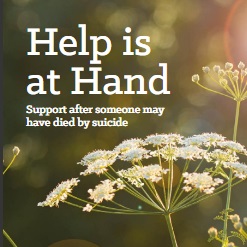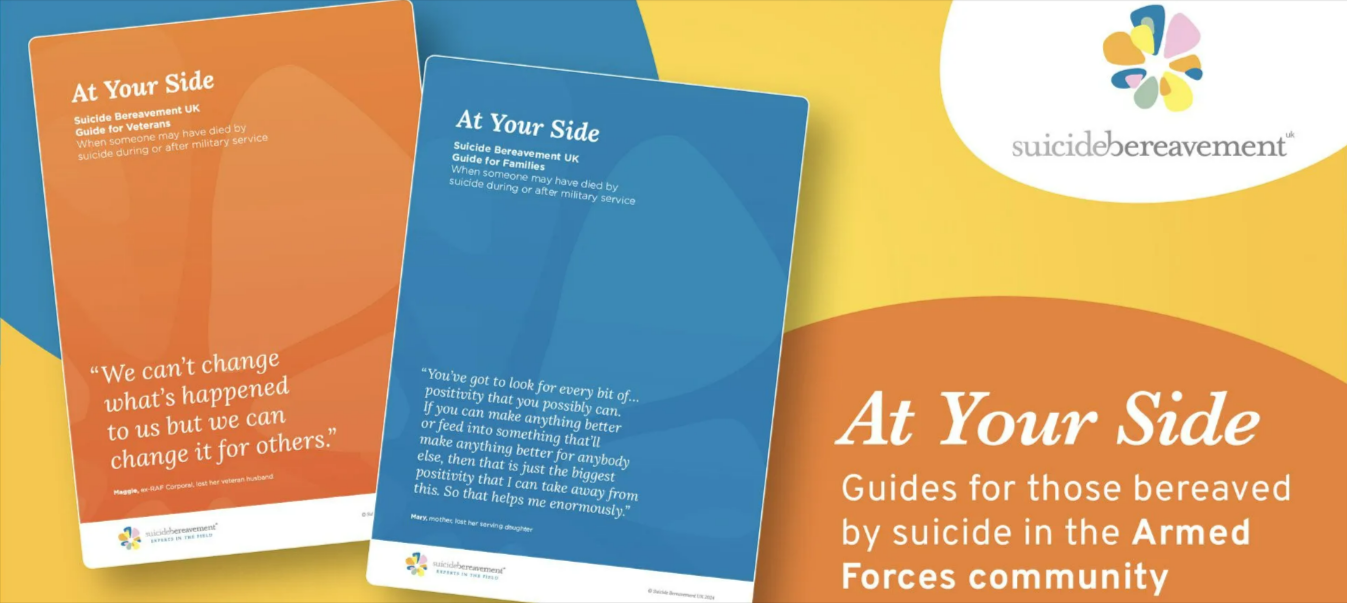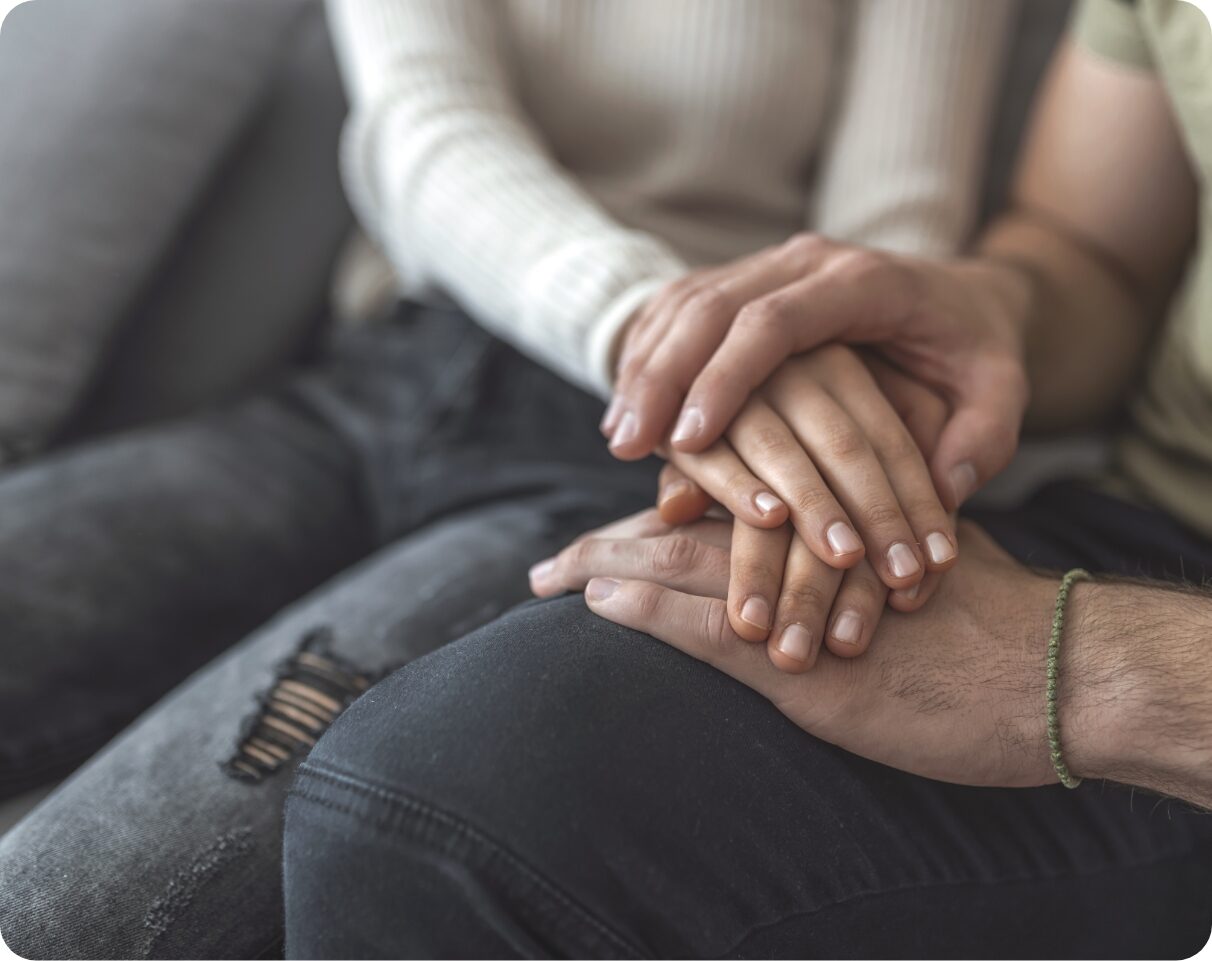I've lost someone to suicide
Have you lost someone to suicide? Are you supporting someone bereaved by suicide?
For urgent assistance visit our Resources page
When you’re bereaved by suicide, it is often described as ‘grief with the volume turned up’ You may experience a range of emotions from shock and despair, anxiety, depression and hurt. You may feel anger toward the person who took their life for leaving you or toward someone else or yourself for not preventing their suicide. You may also feel suicidal and that life is not worth living without that person.
Help is at hand is a guide we’d highly recommend you read if you have lost someone to suicide, however you are related to the person who took their own life. This guide is supported by Public Health England, Support After Suicide Partnership and the National Suicide Prevention Alliance and has been put together with the help of people who have been bereaved by suicide and may have experienced some of what you’re going through right now.
To download a copy of Help is at Hand click here

Other helpful bereavement support resources
The ripple effect of someone dying by suicide can be immense. The following organisations are there to support anyone who is bereaved as a result of suicide, whatever your relationship to the person who took their own life.
Amparo – support for following suicide is completely confidential and can provide short-term or longer-term support, provided one-to-one, to family groups, groups of work colleagues – whatever you prefer and is most appropriate to your situation.
Amparo is currently offered by telephone or video link, in person, ‘walk and talk’ or in community venues.
The service is not just for ‘next of kin’ – anyone who has been affected by suicide and is living in the following areas can access Amparo: Cheshire & Merseyside, Coventry & Warwickshire, Kent & Medway, Lancashire, Lincolnshire, Mid and South Essex, North Central London, South Yorkshire, Staffordshire and Stoke-on-Trent, Thames Valley, and for serving personnel within the British Armed Forces.
Support After Suicide Partnership provide a free guide on supporting someone bereaved by suicide
Suicide&Co provide a range of services specifically to support those bereaved by suicide. They have their own Helpline which you can call on 0800 054 8400 from 9am-5pm Monday to Friday.
Sidekick by Suicide&Co is a FREE app designed to support you through your suicide loss journey, providing both general mental health exercises, and personalised suicide bereavement specific resources. Everyone’s grief journey is unique, which is why this App includes a variety of resources to help you find the right support for you.
Mind – the nationally recognised mental health charity also provides information on bereavement, where to go for support, and suggestions for helping yourself and others through grief
The Compassionate Friends (not suicide specific) – supporting bereaved parent and their families
SOBS (Survivors Of Bereavement by Suicide) is a national charity providing dedicated support to adults who have been bereaved by suicide. They currently have around 150 volunteers across the UK who help to run their services and who come from all walks of life but nearly all have been touched by suicide themselves, this experience enables them to connect with others.
Cruse Bereavement Care offers telephone, email and website support. They have a Freephone national helpline 0808 808 1677 and local services, and a website (hopeagain.org.uk) specifically for children and young people. Cruse has a network of 5,000 trained volunteers and are confidential and free. Cruse also provides training and consultancy for external organisations and for those who may encounter bereaved people in the course of their work.
Campaign Against Living Miserably provoke conversation, run life-saving services, and bring people together so they reject living miserably, get help when they need it and don’t die by suicide. They also publish helpful articles on the topic of bereavement by suicide – click here to access these articles.
Suicide Bereavement UK
Support for Armed Forces

Suicide Bereavement UK have developed a series of At Your Side guides for those bereaved by suicide in the Armed Forces community.
Three guides have been written by the bereaved for the bereaved:
- At Your Side guide for veterans
- At Your Side guide for families
- At Your Side guide for serving personnel
Both the veteran and family guide were launched on the 17th April 2024. The serving guide will be launched shortly afterwards.
The guides are dedicated to those bereaved by suicide and to those they have lost in the Armed Forces community.
To download these guides click here
Further support services for those who have experienced a loss
Grief Encounter‘s mission is to give every child and young person access to the best possible support following the death of someone close. They work closely with individuals, families, schools and professionals to offer a way through the anxiety, fear and isolation so often caused by grief. They have a helpline 0808 802 0111.
Bags for Strife is a charity set up by people who have lost someone to suicide and who were struck by the lack of accessible support. They reached out to others who have been through similar circumstances and realised that their experience was not unique. BAGS will aim to provide practical and emotional support both for the short and long term. The contents of the bags are tailored to what you need in both the immediate term and longer term, ranging from the practical to the emotional.
Just ‘B’ offers expert emotional wellbeing and bereavement support to children, young people and adults across the communities of North Yorkshire, as well as specialist support regionally and nationally.
The New Normal Charity was established in 2018 by two friends, Ben and Jack, and provides a safe space for people and to receive free peer- led support so they can talk openly about any form of bereavement they have experienced. Groups are free to attend and can be joined in the UK and overseas
Child Death Helpline is a freephone service for all those affected by the death of a child, operated by a dedicated team of volunteers who are all bereaved parents.
2wish provides support for those affected by the sudden death of a child or young person, aged 25 and under.
Suicide Bereavement UK have a free to download ‘notification table,’ designed for those bereaved by suicide – a valuable resource as many feel overwhelmed when they have to notify people when a loved one has died.

Samaritans run free online peer support groups for people bereaved by suicide. Facing the Future gives you the opportunity to meet others who have lost someone to suicide and share your experiences and feelings. Support groups run weekly for six consecutive weeks and last for 90 minutes with a maximum of ten participants. Groups are free of charge and are facilitated by two trained volunteers.
Explaining a loss by suicide to a child or young person
Many parents struggle with how to tell their children that a close family member or friend has died by suicide.
Understandably, the stigma surrounding suicide can make such a conversation difficult, sometimes resulting in the young person discovering the ‘truth’ months or even years afterwards.
By delaying this conversation, this can lead to repeating the bereavement process and in some cases resentment might be experienced because the child or young person feels the truth should have been told them right away.
We hope you find the following resources are helpful:
“Helpful Guide – When a Loved One Dies by Suicide” is a wonderful journal aimed at children and young people and created by headteacher and Advanced Grief Recovery Method Specialist Deborah Brown.
Deborah sent a copy of the journal to us at The Jordan Legacy and we think it is a wonderful tool to help any child understand and process the loss of a loved one to suicide.
 To order a copy of this journal via Amazon, use this link.
To order a copy of this journal via Amazon, use this link.
Alfie’s Squad
When Alfie’s Dad took his own life, there was no support where he lived in Merseyside for children bereaved by suicide, so at just 9 years old, Alfie decided to set up Alfie’s Squad.
When Alfie appeared on BBC Breakfast News in 2024, Alfie’s Squad received so many enquiries that they decided to create and online support group.
Split into 2 age groups-7-11 and 12-17 years old, these weekly online sessions include different fun activities and challenges for children and young people to take part in.
At Alfie’s Squad, they aim to reduce the feelings of isolation, and improve self-worth in children and young people who have suffered a loss due to suicide.
The support group is not a counselling group. It is a safe space where children can have fun, knowing that the other children in the group have suffered a similar loss, so they understand what each other is going through.
For details about the online support group click here.
Chilypep is a young people’s empowerment project founded in 2021. As part of this project they have created the ‘Walk with me’ toolkit . Page 9 specifically deals with ‘How to talk to your child about suicide’.
Winston’s Wish is a UK-based childhood bereavement charity. They provide a wide range of resources, including how to speak to children about suicide. They highlight the importance of being honest and explaining what has happened. They all provide specialist suicide bereavement support for children, young people and families following a death through suicide. The following page on their website covers: How to explain suicide to children and young people.
The Winston’s Wish website also includes a shop where you can purchase excellent resources, such as a book we’ve been recommended called Beyond The Rough Rock
And in 2023, Winston’s Wish launched “Talk Grief” – a youth led grief network, which they describe as “a dedicated online space for grieving teenagers and young adults to find support, help others and say it how it is – the good, the bad and the ugly.”

